Copyright ©2006 PopEntertainment.com. All rights reserved.
Posted:
July 14, 2006.
When director
Richard Linklater (Dazed and Confused,
School of Rock,
Before Sunset)
decided to film
sci-fi novelist Philip K. Dick’s extremely autobiographical 1977 drug
cautionary tale A Scanner Darkly, he knew he was taking a big
chance artistically and commercially. He’s not the first – Dick’s pitch
black world view has always been seductive to thoughtful filmmakers. His
short story “Do Androids Dream of Electric Sheep” was the basis for Ridley
Scott’s classic parable Blade Runner. Steven Spielberg took on his
novel Minority Report. Several of his other works have hit the
screen as Total Recall, Payback, Screamers and Impostor.
However, A
Scanner Darkly, with its hallucinogenic images and highly paranoid
vision was undoubtedly the most ephemeral of Dick’s musings, a story very
specific to its creator and its time and yet at the same time strangely
universal.
In casting the film,
Linklater reached out to some actors who he felt could understand Dick’s
vision. Artists who had been slightly dinged up in their own lives and
could relate to the desperation of the characters. These actors included
Keanu Reeves, Robert Downey Jr., Woody Harrelson and Winona Ryder – most
of whom has spent a certain amount of time in the gossip columns and the
police blotters as well as on soundstages.
“I actually had a
really emotional reaction to seeing the movie in Cannes, because I
realized how touching and personal it was,” Downey says. “It’s Dick’s
story. It’s science fiction. But it’s [also] kind of about this
generation of actors who – well maybe except for Keanu – we haven’t really
gotten through the last ten years all in one piece.”
Not that we see them
in the film – well not exactly. Linklater decided to do this film through
his own special brand of animation called interpolated rotoscoping. The
process, which Linklater debuted with his dream-state fantasy Waking
Life, calls for the movie to be filmed and then for a group of
animators to painstakingly go over each frame. It gives the film an oddly
fluid feel, much more accurate than traditional film animation. It almost
feels like a graphic novel come to life.
Of course, filming
to just be drawn over opens up all sorts of freedoms and possibilities to
an actor, ones which Downey acknowledges he didn’t fully take advantage
of.
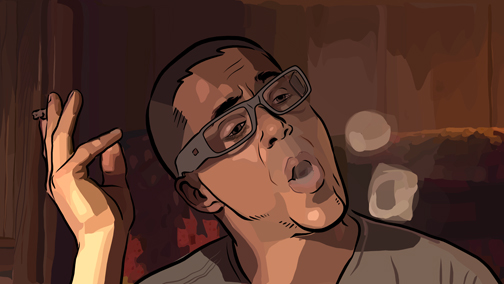 “I
kind of forgot; to tell you the truth,” Downey smiles. “I forgot and then
I was really pleased. The greatest smoke ring blown in the history of
cinema, and that’s no small feat.”
“I
kind of forgot; to tell you the truth,” Downey smiles. “I forgot and then
I was really pleased. The greatest smoke ring blown in the history of
cinema, and that’s no small feat.”
Still, Downey did
see the original footage and was rather shocked by the changes that came
out of it.
“It looked really
simple… and crude… and improperly lit, which it was. But it also
would have sufficed. This interpolated rotoscoping – the long way of
saying trippy – was a good fit.”
Another good fit for
Downey was just the opportunity to work with Linklater.
“I saw
School of Rock
and I’m
like why haven’t I worked with Richard Linklater already?” Downey
recalls. “They’re like, ‘Oh and he also did that…’ I’m like, oh and
Dazed and Confused? Then by the time I got him I said I’m really
pissed off. I feel like you owe me some – what do you call it?
Retroactive swag. So he gave me the ten year anniversary of Dazed and
Confused t-shirt, which I still wear with relish.”
Linklater soon
decided that Downey was someone that he wanted to work with as well. For
years he had been working on A Scanner Darkly as a passion
project. He sent a draft of the screenplay to Downey and asked him to
look it over.
“I read the script
and I was like this is nuts,” Downey says. “Oh my God, I bet it’s going
to be cool. And Keanu’s playing the lead. So I went to the chateau. We
just started to have this spitball session. We talked about characters
and all that with Woody and Winona. It was just a great experience.”
Not that he would
have done the script for just any director. “It would have had to have
been someone really special,” Downey admits. The chance to finally work
with Linklater is what sealed the deal. “I am convinced that he is one of
our great American directors.”
So Downey went down
to Austin, Texas, Linklater’s base of operations, and started trying to
get into the head of his character. “We would talk on subjects,” Downey
recalls. “[Linklater] would say, ‘What would this tweaked-out
propellerhead say?’ I’d say, well, let me think. You know, whatever…
“It was a room like
this,” Downey continues, gesturing to the hotel conference room where we
are sitting, “except a lot muggier with bats around, because we were in
Austin. Some gal would come in and be like, you know… I don’t know, maybe
she’d have a zit on her cheek or something. When she left we were all
like, bug bite, huh? Then the next day I’d be calling Arctor or Fred a
bug bite. That’s the great thing about [Linklater]. It’s very specific.
He calls shooting ‘the ground war.’ It’s just this very incremental move
towards the finished product. He works you like a rib but he’s so
collaborative.”
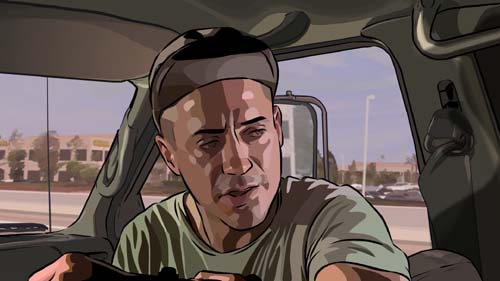 The
character of Jim Barris is a verbose know-it-all, a drug-addled idea man
whose ideas don’t work nearly as often as he’d like. He’s always got a
scheme or an invention that he is working on, but mostly Barris is one of
those guys who just like to baffle you with bull.
The
character of Jim Barris is a verbose know-it-all, a drug-addled idea man
whose ideas don’t work nearly as often as he’d like. He’s always got a
scheme or an invention that he is working on, but mostly Barris is one of
those guys who just like to baffle you with bull.
“If you’re anything
like me there are days when you’re pretty convinced that you know more
than everyone around you anyway,” Downey smiles. “Which are often
confirmed by your interactions with people. So, I just know that if you
talk faster and use more ten dollar words than anyone, you can convince
half of them that they should shut up, because you know what you’re
talking about. The great thing is that it’s hard-wired into the script.
He says, ‘I’ve got to figure it out. I installed different cameras…’
And of course when he gets there he didn’t turn them on. I invented a
better silencer for $0.23 of Reynolds’ Wrap and it doesn’t work. That’s
not the answer. I think Dick was really fantastic at throwing out the
stereotypes – or an archetype, better yet – and then showing you why it’s
full of holes.”
The holes are
showing particularly in Downey’s showiest scene, a hysterical segment
where Barris buys a secondhand bike for cheap and only eventually comes to
realize that it is hot and he has been ripped off.
“I just kept looking
at it and saying, follow the logic of a scene,” Downey says. “This was
somebody who is obviously again wrong, but is very excited about how great
things are. Then his life crashes before his eyes and he pulled everyone
else in. When she says, ‘Maybe it was this or that,’ I go, yeah, but you
know this is a boy’s bike. He condescends to people. So I just follow
the straight of the scene and improvise on that and then lock into it.
“I don’t want to hit
on the bike scene too much, but the entirety of the cast falls to
smithereens there behind me,” he laughs. “He’s one person introducing an
item of novelty, in this case a second-hand bike. But there are all these
scenes. Like, you know when they’re by the side of the road. When it
starts to escalate and you don’t know really who can trust who. I read
the script, but I try to look at these things through the eyes of a child
when possible.”
Downey admits that
he hasn’t read any of Dick’s novels, but he said that was not so much a
reflection on the author as it was on his limited time for reading. “I’m
reading Confessions of a Corporate Hit Man [by John Perkins],”
Downey says. “I saw it in a secondhand bookstore. I was like, wow, this
was written in 2004. I’m almost up to speed with what’s going on now in
the literary world.”
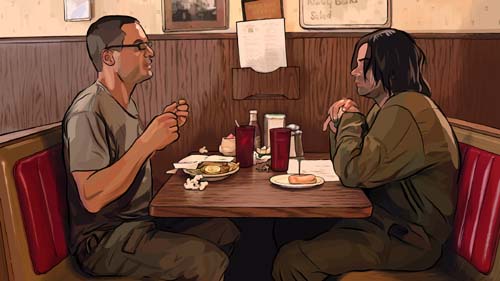 So
even if he hadn’t read the book, does he think they all just got it?
Nailed the characters and ideas that Dick was apparently trying to impart
in his cautionary tale?
So
even if he hadn’t read the book, does he think they all just got it?
Nailed the characters and ideas that Dick was apparently trying to impart
in his cautionary tale?
“I would say that
Rick and Keanu got it,” Downey says. “That Winona looked great. She’s a
great actress and she’s very smart. Woody and I were basically in a
scenery chewing competition. At one point I shoot off this silencer and I
hear thud. And I go; did he just fall out of the tree without a crash pad
underneath him? What is he trying to do? This is my scene! I look over
and he’s like (laughs and makes gesture). ‘That’s lunch.’ It was
fantastically fun.”
So it was a fun
shoot apparently. However, it was still a really tough job.
“It was a period in
time, you know?” Downey says. “It was in Austin. We were all staying at
this golden hotel. Woody wouldn’t put on air conditioning. Keanu had his
bass in the next room. Winona was like,” he imitates a girl’s voice,
“’Guys, you want to go to a movie?’ It’s like, no; I want to make a
fucking movie. I’m studying. She was like, ‘Oh, all right. Don’t become
serious about this lighthearted part you’re doing.’ I was like,” he takes
on a gruff voice. “Shut up, you study your lines, too! I was so fucking
uptight.” Downey laughs. “Because it was hard. It was hard. I went to
work. When I wasn’t shooting on the set I was studying. I went to the
gym, studying at the gym. I went and ate at the same restaurant every
night. I just went in like it was fucking boot camp.”
A Scanner Darkly
was a
particularly interesting case in point, because it is so character
driven. Not much really happens as far as plot goes, but these five
fascinating losers devolving in concert makes the story intriguing.
Coming off of Kiss Kiss Bang Bang, Downey’s acclaimed but
little-seen 2005 noir crime drama with Val Kilmer, it was a nice
switch-up.
“Kiss Kiss Bang
Bang was – the story was the plot. Then the characters played a
little bit around within that. To me it was just this glorious outcome.
A Scanner Darkly has themes and layers, but ultimately who cares
about what’s happening and what it means? It’s again why I think
Linklater is such an American treasure, because directing is a really tall
order. To understand how you kind of dial it in so that whatever that
waveform is… it’s all those points. It isn’t just technical or isn’t just
emotional.” Downey laughs. “I’d much rather have something be technical
than emotional, which is a little bit odd to say as an actor, but I’ve
just seen so many people they just like turn it up to eleven. Like,
'Ooooooh fuuuuuucccccccckkkkkk!' Wow. That was a big fuuuucccckkking
scene. 'Oooooooooooooooooh!' You know.”
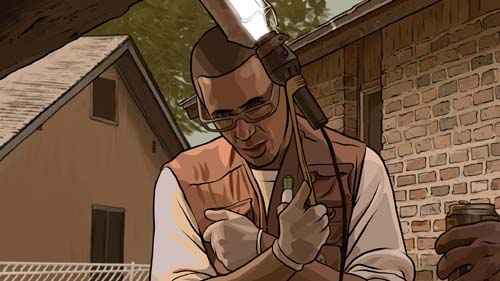 A
Scanner Darkly,
with its themes of
government invading personal space and paranoia also seem strangely
trenchant in a world of NSA wiretapping. However, Downey only buys into
that argument so far.
A
Scanner Darkly,
with its themes of
government invading personal space and paranoia also seem strangely
trenchant in a world of NSA wiretapping. However, Downey only buys into
that argument so far.
“I’d say you have to
give credit to any institution that’s so evil that they’re completely
running the program,” Downey says. “I’m not a big illuminati guy. I
think that paranoia goes from generation to generation. It’s convenient
if you’re neurotic to imagine that there’s people controlling everything
by a way that’s manageable and small. Like the fucking Wizard of Oz to
tell you the truth. But that’s not life. Life is messy.”
Downey has been on
the cusp of superstardom for so many years that it seems almost impossible
sometimes. Despite critically revered turns in Chaplin and other
films, he is often surprised when a film does not capture the attention
that it deserves. Not that Downey feels that lack of an audience means a
bad film.
“Disappointment,
humility, it’s all relative,” he says. “I just look for the highest
degree of difficulty and disappointment, just because of better quality.
Like I said, life’s really messy. Either the cosmos has order to it or it
doesn’t. I choose to believe that it does. So to judge or compare is a
really dangerous pastime. I think that I hold the record for having been
the actor who has done the most movies and still makes the same amount of
money as when I was three movies in. How much is so and so making? ‘He’s
getting four million dollars.’ I go, what’s his name again? ‘Yeah, well
he was in this movie. It wasn’t a hit, but boy he’s hot.’ I’m like,
well, wow, how did he do that? It’s my lot in life just to be really
patient and wait and be disappointed. It’s not about your day job,
anyway. It’s about what you’re here to do, whatever that is.”
Not that he’s
totally averse to just taking a job for the money. After all, he did
appear in Disney’s remake of The Shaggy Dog with Tim Allen. And
you know what, that’s okay, too.
“I just wanted to be
in a Disney movie and they offered it. Best job I ever had,” Downey
laughs. “The craft service is a million. It’s fucking crazy. ‘Hey,
thanks, we got that shot with you and the monkeys. We’ll see you in three
weeks. Did you get your check?’ I’m like, yeah! Wow.”
Downey has also
recently finished filming the highly anticipated thriller Zodiac
with director David Fincher (Panic Room, Se7en and Fight Club).
Downey welcomed the opportunity to work with the notoriously
perfectionist filmmaker.
“He’s very tough on
technique. So if you’re a technically proficient actor, you’re going to
survive. If you’re not, you’re going to hate him. I love him.”
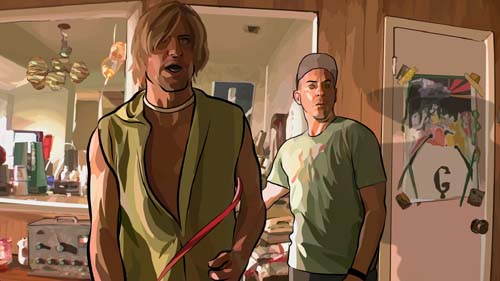 Downey
has worked with some of the greatest directors in film today. Is there
some kind of connection that he searches for when he is working with a
director?
Downey
has worked with some of the greatest directors in film today. Is there
some kind of connection that he searches for when he is working with a
director?
“It’s always the
same thing. I want to find a man or a woman where we become a third thing
to get in the first thing together. That’s it. I’m not interested
arguing. I’m not interested in imagining that the status is any different
than it ever is. It’s a director’s medium and you’re there to serve the
piece. If the piece happens to be the character on what’s happening and
what the character means and what the story’s about, then you’re always
kind of playing the director in a way. If a director is confident enough
with himself to realize that that’s the outcome that can happen, then it’s
a fucking love affair.”
If Downey is not at
the top of the A-list at this point in his career, that doesn’t mean that
he isn’t working steadily.
“Zodiac
is done. Fur
is coming out. Now I’m doing this movie called Charlie Bartlett in
Toronto, which I adore. John Poll, who is Jay Roach’s editor and
producing partner, is directing it. It’s this fantastic kind of… almost
like if Mean Girls was like Harold and Maude type thing, you
know? I play a school principal.
“Movies are still a
mystery to me, because they are alive. The experience of making them and
the process… we’re left with these articles or stuff that come out. But
you want to know what I’ll remember? What it felt like in the room. What
kind of day it was. It was raining and now it’s not. That’s what I think
is so magical. Every frame and every instance of the film is kind of
supported by the – and I’m not big on this word – but the karma of people
who came together and did it. It’s one thing to have that Bodhi tree
bullshit attitude. It’s another thing to come to realize it’s largely
true. [A Scanner Darkly] ten years ago would have meant one
thing. Twenty years ago. If they made it into a movie right when it was
written it would have been proper. But it’s just again seeing those
cycles. Now having been around for enough cycles to understand that I’m
playing the school principal instead of the rebel student, things tend to
repeat themselves in a way that is predictable and yet exciting.
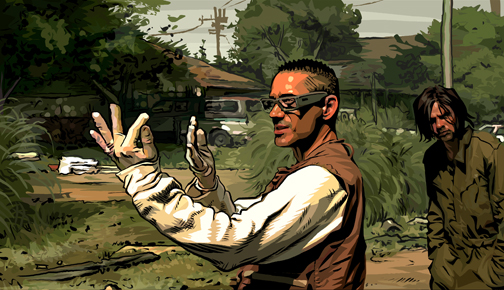 So
since A Scanner Darkly is a view of our not-so-distant future, does
Downey think it will have relevance in the upcoming years? As mankind
catches up to Dick’s vision, well it still resonate as it did?
So
since A Scanner Darkly is a view of our not-so-distant future, does
Downey think it will have relevance in the upcoming years? As mankind
catches up to Dick’s vision, well it still resonate as it did?
“I bet it does,”
Downey agrees and then pauses a moment to collect his thoughts. “I just
decided to put myself under the impression that everything is so layered
and things are so binary that one and zero adds up all these things. The
next thing you know, you’ve got a fucking screensaver. So to break things
down into; is this good? Is this bad? Is this going to be hard? Is this
going to be worth it? Are these going to be scary years? Is there going
to be a cataclysm? What do you fucking think? Things change. A lot. I
think this is an exciting time. I think so. I think it’s an exciting
time in film, which sometimes is an indication for where society is at.
“They say an
optimist believes the future is uncertain,” Downey says. “A pessimist is
always right, but derives no satisfaction from always being right. So
it’s my duty to be an optimist, yet clearly the pessimists have more
fucking information because they’re always right.”